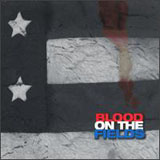Home » Jazz Articles » Album Review » Wynton Marsalis and the Lincoln Center Jazz Orchestra: B...
Wynton Marsalis and the Lincoln Center Jazz Orchestra: Blood On The Fields
But the real stars of the show are the vocalists who deliver the tale of an African prince, forced into slavery, who finds genuine friendship from a rather common but insightful woman who has the strength to help him cope. Together they share their fate with the audience and search for ways to deal with their plight. Wilson's deep contralto matches her character; Griffith's singing, as well, matches his perplexing role; but it's the energetic Hendricks who infuses a livelier aspect of jazz with the libretto. The libretto contains many astute examples of Marsalis' charming way with words: "Soul for sale," "romance can't be sold," "talking work animals," "dog-bit, chain-burned," and "Us sold us to this damned world."
Musically, the score follows from some of Marsalis' earlier works, such as Citi Movement, In This House, On This Morning, Blue Interlude, and his string quartet "At The Octoroon Balls." In Blood On The Fields, Marsalis can be heard squeezing out the blues on "You Don't Hear No Drums." James Carter lets loose with a spiritual-tinged baritone saxophone stroll on "Plantation Coffle March." Victor Goines spins a soulful tenor saxophone solo on "Lady's Lament." Marcus Printup and Roger Ingram work out over a highly rhythmic "God Don't Like Ugly." Carter and Goines supply bass clarinet noodling as Herlin Riley states the effect of "Forty Lashes." Violinist Michael Ward provides a nice change of pace on the two "Calling The Indians Out" tracks, evoking the image of an authentic hoe-down. Alto saxophonist Wess Anderson wails on "The Sun Is Gonna Shine," and the whole orchestra sees solo action on "Back To Basics." Recommended.
Personnel
Wynton Marsalis
trumpetAlbum information
Title: Blood On The Fields | Year Released: 1997 | Record Label: Columbia Records
Tags
PREVIOUS / NEXT
Wynton Marsalis Concerts
Support All About Jazz
 All About Jazz has been a pillar of jazz since 1995, championing it as an art form and, more importantly, supporting the musicians who make it. Our enduring commitment has made "AAJ" one of the most culturally important websites of its kind, read by hundreds of thousands of fans, musicians and industry figures every month.
All About Jazz has been a pillar of jazz since 1995, championing it as an art form and, more importantly, supporting the musicians who make it. Our enduring commitment has made "AAJ" one of the most culturally important websites of its kind, read by hundreds of thousands of fans, musicians and industry figures every month.





















